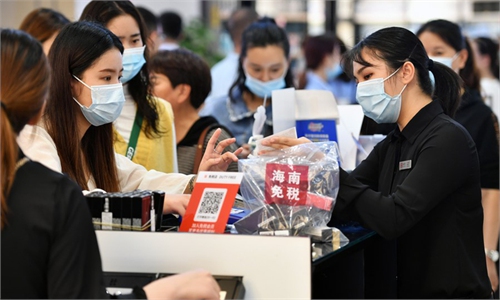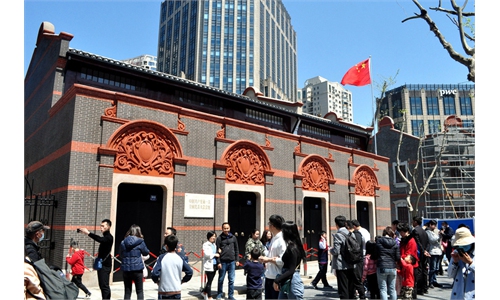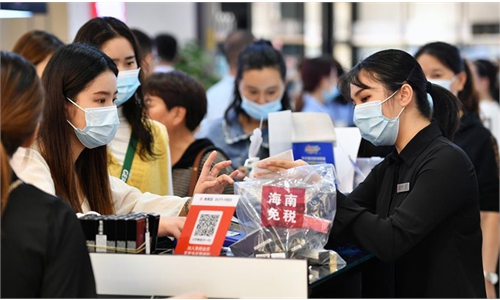China to start month-long campaign to boost spending, as consumption remains low
Significant room remains for consumption recovery: analysts
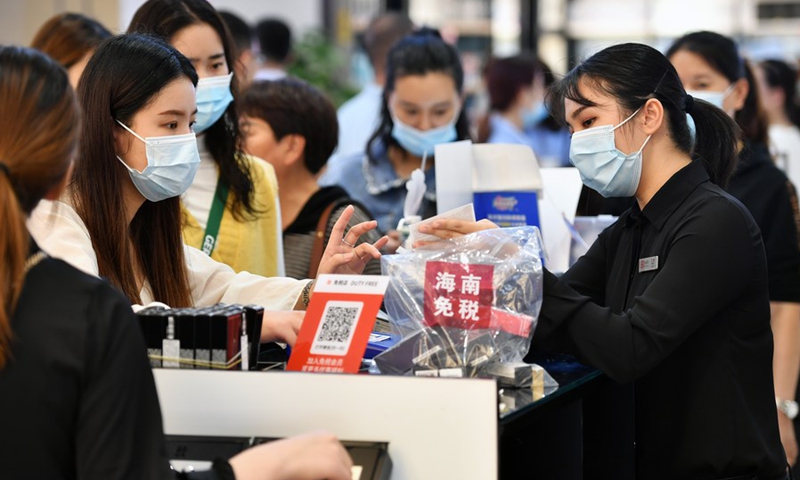
Photo:Xinhua
A month-long national campaign to rev up wide-ranging consumption will commence on Saturday with a series of promotional activities planned across the country, the Ministry of Commerce (MOFCOM) announced on Sunday, as consumer spending in the country remains relatively low compared with pre-pandemic levels and crucial for a sustained post-virus recovery for the Chinese economy.A launch event for the consumption promotion month will be held in Shanghai on Saturday as part of a raft of activities throughout May to put consumption on the front burner. Simultaneously, Shanghai will launch its May 5 shopping festival while promotions are set to be rolled out in multiple regions including Beijing and Chongqing municipalities, Suzhou in East China's Jiangsu Province and South China's Guangdong Province, MOFCOM spokesman Gao Feng told a press conference in Beijing.
Meanwhile, China's third annual national online shopping festival will kick off Wednesday, featuring premium domestic products, famous items from Silk Road e-commerce partner countries, as well as online services in the catering, tourism, culture and sports sectors, with new business models such as livestreaming and social media shopping, Gao stated.
There will also be activities specifically designed to promote regional cuisines across the country and revitalize local time-honored brands, according to Gao, who made a special mention of the upcoming China International Consumer Products Expo in Haikou, South China's Hainan Province.
The Ministry of Finance is working with MOFCOM, the General Administration of Customs, the State Taxation Administration, and other government departments to draw up duty-free policies for overseas items to be showcased at the expo.
Relevant tax breaks will be announced soon, and imported products on display during the expo that meet certain qualifications will be duty-free, Zhu Xiaoliang, director of the MOFCOM's Department of Consumption Promotion, said at the press conference.
The number of exhibiting firms has reached 648 and there will be 1,319 participating brands from 69 countries and regions, Zhu revealed. Global brands from countries including Switzerland, France, Japan, the US and the UK will host more than 70 events during the expo to launch more than 100 new products falling under dozens of categories such as clothing, bags, food and beverages, and jewelry and diamonds.
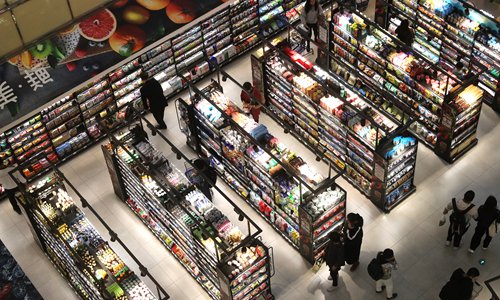
Photo:Xinhua
The high-profile campaign to sweep across the country over the coming month comes on the back of a conspicuous rebound in retail spending this year.In the first quarter, retail sales grew 33.9 percent year-on-year, or a rise of 8.5 percent compared with the same period of 2019, official data showed.
Still, as Gao noted, the consumption recovery remains unbalanced, with some sectors, business models, categories and regions in a comparatively slow mode and the demand of the average shopper yet to be fully satisfied.
In a research note sent to the Global Times, Goldman Sachs economists led by Hui Shan wrote that "over the 2019-21 two-year period, retail sales only grew about 4 percent per year, much lower than the 8 percent pre-COVID-19 growth rate," an indication of significant room to improve.
However, the household savings rate remained stubbornly high in the first quarter and vaccination still has a long way to go before herd immunity is achieved, the economists reckoned, noting that "the consumption recovery will be gradual on a sequential basis, although year-over-year growth is likely to look strong."
The month-long campaign, an annual arrangement introduced in 2012, will serve as a platform to coordinate both domestic and overseas resources, forge links between urban and rural markets, and strengthen the role of bigger cities in fostering consumption of their surrounding areas, Zhu said.
As part of the wide-ranging and nationwide campaign, Wuhan in Central China's Hubei Province will host an array of consumption-themed activities to pitch locally made products and showcase local cultural heritage and nighttime consumption, according to Zhu.
Over the course of the campaign, Shanghai will launch a trial of applications of the digital yuan, he disclosed, and China UnionPay will team up with 10-plus banks to offer card promotions in fields including shopping, catering, accommodations, transport and tourism, with the participation of about 1 million merchants and outlets.
In a sign of thriving participation, Shanghai Yuyuan Tourist Mart (Group) Co has announced that some of the company's consumption and restaurant brands will take part in the May 5 shopping festival, with 10 million "lucky bags" worth a total of 1 billion yuan ($153.96 million) to be given out.
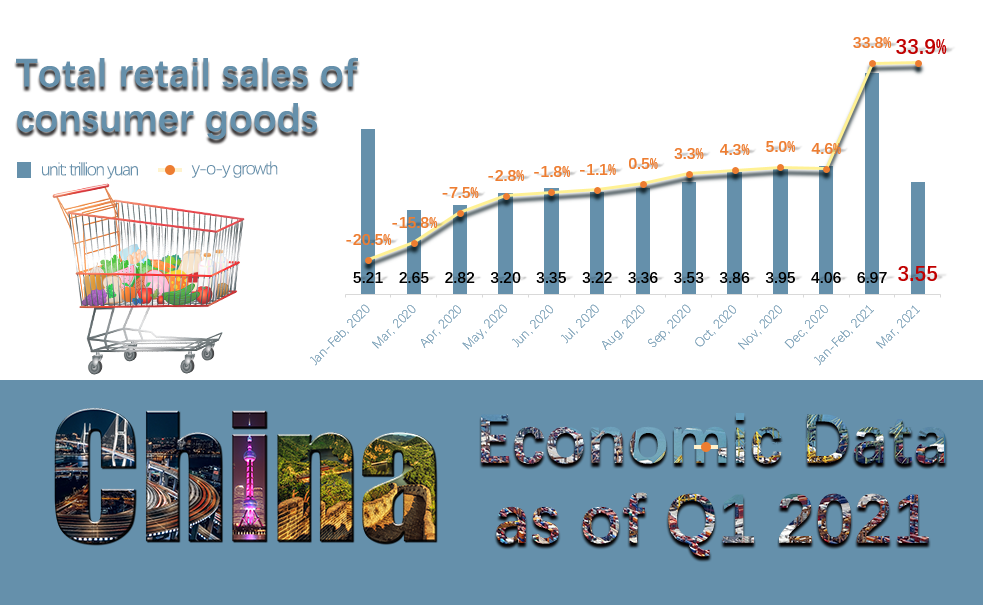
Graphic: Deng Zijun/GT
The month-long festival plays an important part in improving residents' propensity to consume, but the key to the recovery of domestic consumption to pre-coronavirus level lies in the pandemic situation, Tian Yun, vice director of the Beijing Economic Operation Association, told the Global Times on Sunday."Given the comparatively sound increase in disposable incomes, if authorities can further boost vaccination coverage and step up efforts to prevent imported cases, China's consumption growth rate is expected to return to the normal level recorded in 2019 during the third or fourth quarter of this year," Tian said, projecting that the figure will be above 15 percent in 2021.
Latest data from the National Bureau of Statistics showed that nominal per capita disposable income grew 13.7 percent year-on-year to 9,730 yuan in the first quarter of this year.
China's huge market advantage of 1.4 billion people, along with the trend of consumption upgrading, makes boosting domestic consumption a top priority for an economic recovery in the post-COVID-19 era rather than financial easing, Cong Yi, a professor at the Tianjin University of Finance and Economics, told the Global Times.
